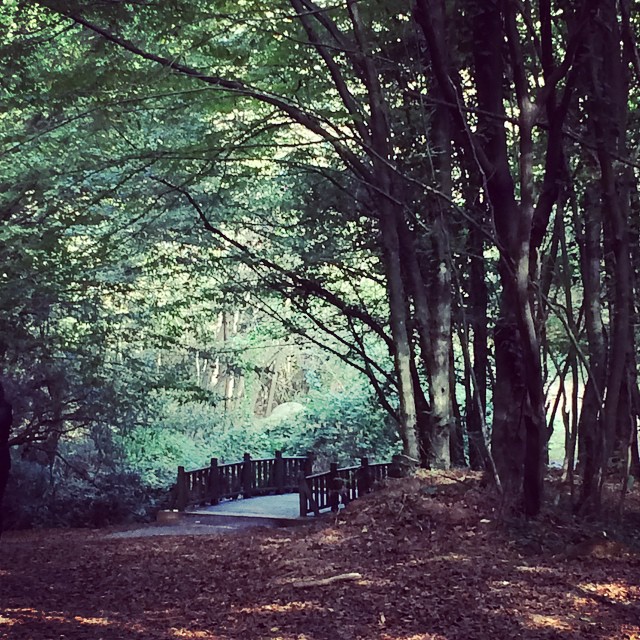Paradise lost: Truck traffic rattles İstanbul’s Polish village

Antoni Dohoda is seated with his Polish and Turkish guests in the garden of Leonardo Restaurant and Café on a late afternoon one weekday, sipping tea and talking about the fascinating history of his village.
Suddenly, five big dump trucks barrel through the village in succession, disturbing the solitude.
Visibly upset, the 78-year old Dohoda stands up and shakes his fists at the trucks that whiz by Polonezköy’s main street, along which his café-restaurant stands.
“They’re driving us nuts,” he says, as he covers his ears. “Our nerves are shot. We are losing business because of this unbearable truck traffic.”
His guests, a newlywed couple from Poland visiting Istanbul and a Turkish journalist, are also jarred by the screeching noise made by the passing vehicles.
Dump trucks
As many as 1,000 large dump trucks and hundreds of smaller commercial vehicles thunder through Polonezköy daily, rattling the lives of 490 people who make the 172-year-old village their home, and disturbing hundreds of tourist visitors, Mr. Dohoda, a plump and cherubic figure, says.
Founded by Polish refugees, Polonezköy (or Polish village in Turkish) is perhaps the oldest Polish settlement outside of Poland.
A rural setting nestled in a lush, meadowland area surrounded by oak forests and wilderness, Polonezköy is located about 30 kilometers (24 miles) north of the city on the Asian side of Istanbul, near the district municipality of Beykoz.
The village is on the shortest and least-crowded route for the trucks carrying construction materials from open-pit mines north of the city to sites in Asian and European Istanbul, which is undergoing a major construction boom.
The trucks are transporting dimension stones (marble, granite, sandstone and slate), sand and gravel. They are also moving debris from old, demolished buildings in slum areas of the city, where massive urban renewal projects are underway, to rubble-dumping grounds near the Black Sea coast.
The trucks leave a trail of dust and gravel on the road as they zoom by Polonezköy.
The truck traffic is banned on Saturdays and Sundays from June 1 through Oct. 30, the height of tourist season, but permitted during other times, says Marilyn Dohoda, Mr. Dohoda’s daughter-in-law who runs the restaurant and café with her husband, Jan Dohoda.
Due to an increase in truck traffic, the once-serene country village is losing its charm as an Arcadian getaway for residents of İstanbul fed up with the crowds, noise and the hectic ways of city life.
Sheltered by the Ottoman sultan, Polish refugees and their families established the village in 1842. Today it has five hotels, 29 pension houses and numerous restaurants and cafés, serving visitors the best of Polish hospitality and cuisine.
Many wealthy Turks have hacienda-like farm mansions in Polonezköy, including the brothers Erol and Haldun Simavi, former publishers of the mass-selling newspapers Hürriyet and Günaydın; Alp Gürkan, chairman of Soma Holding, one of Turkey’s biggest private mining groups; and architect and recording star Erol Evgin.
Adampol
The village was originally known as Adampol, honoring its benefactor, Prince Adam Czartoryski (1770-1861), who headed a Polish government-in-exile that was solely recognized by the Ottoman state. Czartoryski paid the Ottoman sultan for the land grant.
The settlers built wooden houses and a chapel, raised cattle, poultry and pigs and grew their own corn and vegetables, as they did in their homeland, establishing a self-sustaining community. They eventually became Turkish citizens, though maintaining their ties to Poland and keeping their Roman Catholicism alive.
During three unsuccessful Polish uprisings in the 19th century against Prussia, Russia and Hapsburg Austria, which occupied and carved up Polish territories, some 8,000 Poles — soldiers, princes, townsmen and farmers and their families – sought protection in the Ottoman Empire. The Ottomans, who fought 12 wars with czarist Russia between the 16th and 20th centuries, were allies of the Polish nationalists and sheltered them.
The refugees were settled in Adampol and in camps in Edirne and Salonika, then a part of the Ottoman state.
Only Adampol, or Polonezköy as it is now known, survives.
Prince Czartoryski’s representative in Ottoman Turkey, Michal Czajlkowski, became an army general under the Ottomans. Known as Mehmet Sadik Pasha, he organized a Polish Cossack brigade from the refugees and fought alongside the Ottoman Turks, the British and the French against Russia during the Crimean War.
Fourth generation
Over the years, most of the families of Polish origin migrated to Western Europe and North America for better jobs. Only 49 descendants of the original Polish refugees remain.
“Young people are leaving. They are seeking their fortunes elsewhere. Zero hour for the Polish community is fast approaching,” Mr. Dohoda said sadly.
A retired electrical engineer who worked for Siemens for 51 years, Mr. Dohoda is a member of the fourth generation of Dohodas of Polonezköy. He speaks Polish, German, English, French and Turkish fluently.
For most of its history, Polonezköy remained a little-known, remote settlement, and had only muddy country roads linking it to Istanbul’s Üsküdar and Beykoz district municipalities.
An elder woman of Polish origin recalled how in her teens it would take a full day by horse-drawn carriage to reach Beykoz along the northeastern Bosporus to get supplies and receive medical attention, and then return home.
“We lived like pioneers in those days,” she said.
Today it is only a 15-minute drive to Beykoz’s Kavacık district from the village, and 20 minutes to cross over to Levent, on the European side of the city, via the Fatih Sultan Mehmet Bridge. It takes half an hour to travel to Üsküdar by car.
The residents turned their country houses into pensions and cafés after the first Bosporus Bridge was built in 1973 and its roads were paved, making Polonezköy accessible and bringing large numbers of inquisitive local and foreign travelers and tourists.
Famous guests
Polonezköy has attracted many famous guests, including Hungarian pianist Franz Liszt, who visited the village in 1847, and French novelist Gustave Flaubert in 1850. Kemal Atatürk, the revered founder and first president of the Turkish Republic, visited the community in 1937, a year before his death.
Pope John XXIII, who was born Angelo Guiseppe Roncali and served as the Apostolic delegate to Istanbul for a decade, visited the hamlet during his reign and delivered sacraments of confirmation to several Polonezköy children.
In 1994, Lech Walesa became the first Polish president to visit the village. His successor Aleksander Kwasniewski visited Polonezköy in 1996 and 2000. During his last trip, the Polish leader stopped off at a museum house in Polonezköy and took part in the celebrations of the village’s 160th anniversary.
Turks from Polonezköy
Turkey’s communist poet Nazım Hikmet (1902-1963) was of partial Polish origin. His great grandfather, General Ozenski (known as Mustafa Celaleddin Pasha), was one of the original Poles exiled to Polonezköy.
Famed Turkish soprano Leyla Gencer (1928-2008) was born in Polonezköy to a Turkish businessman and a Polish mother and became the prima donna at La Scala Opera in Milan.
Leonardo Restaurant
The Leonardo Restaurant-Café is a remodeled 100-year old farm house. Established 21 years ago, it serves Polish foods like Pirozhki, baked buns stuffed with vegetables, meat and chicken; a cabbage soup called Kapusniak; roasted or grilled lamb Baranina; as well as pork dishes. The restaurant-cafe offers 160 different selections of international cuisine every day.
The house, in which the restaurant is located, was owned by Mr. Dohoda’s uncle Leonard, who died 30 years ago.
Paradise endangered
But now, the daily the buildup of truck traffic is threatening this idyllic setting — perhaps the last wilderness area near Istanbul — making visits unpleasant.
“Construction trucks have always used Polonezköy as a route. But the traffic has increased alarmingly over the past two years because of the construction of the third Bosporus Bridge and new express roads, the building of an international finance center in Ümraniye and the ongoing urban renewal projects,” Mr. Dohoda says.
Residents have asked municipal authorities to reroute the truck traffic so that Polonezköy and Cumhuriyetköy — another charming village nearby with stables, equestrian clubs and outdoor restaurants and cafés — can be bypassed.
Their proposed route would add nine kilometers (five miles) of traveling distance for the construction trucks and increase the costs for contractors involved in the building projects, but spare the two villages.
So far authorities, backed by big urban contractors, have resisted any changes to the routes.
Source:
